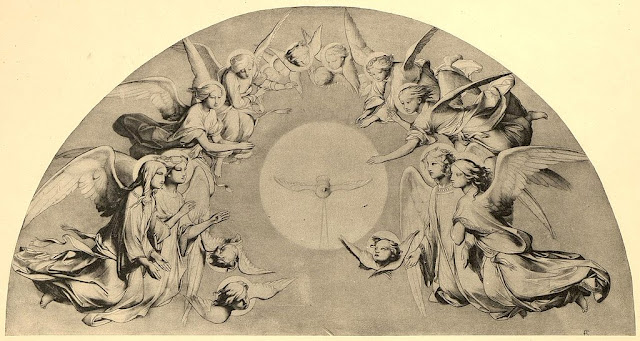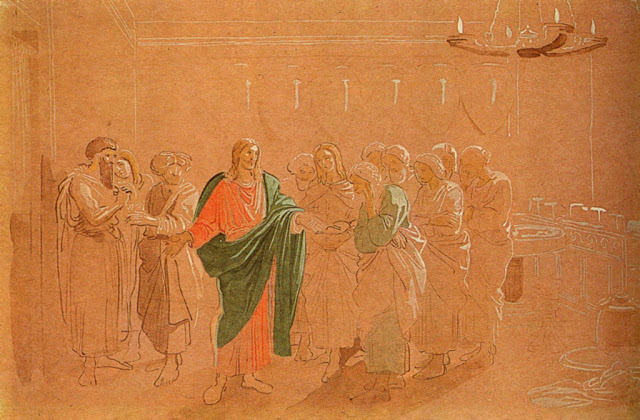The year's at the spring
And day's at the morn;
Morning's at seven;
The hillside's dew-pearled;
The lark's on the wing;
The snail's on the thorn:
God's in His heaven—
All's right with the world!
We all know the feeling Mr. Browning had when he wrote that, even if we haven’t expressed it poetically as he did. When we look out at the beauty of the nature, the splendor of the world around us, we might well be moved to say: “God’s in His heaven – All’s right with the world!”
But is that right? We see shocking, horrific events, like the school shooting in Texas this past week. We endure the sorrows of illness and the passing of loved ones. We struggle under private burdens and crosses, those perhaps unseen or unappreciated by others. We know the weight of our own sinfulness and experience the grief and loss of not always being what God calls us to be. It seems there are lots of things we could point to, and say, “Look here, Mr. Browning – clearly, the world is not all right!”
However, I think he spoke more truly than he knew. For the person of faith, there is a sense in which all is right with the world – namely, because “God’s in His heaven.” Because God reigns on high, we can believe that he sees everything, and so is taking care of everything, and so everything will be alright. It may sound like naivete, especially when have to face those really difficult sufferings and sorrows; but in fact, it is a truth of deep faith. Everything is okay. Yes, the world is not all good, all true, or all beautiful – but God is, and in the end, he will make all things like himself.
In the account from Acts in today’s first reading, the disciples ask Jesus if he is now going to restore the kingdom to Israel. They are ready for Jesus, having died and risen again, to now at last settle all scores, to right every wrong, to show openly his kingship over all the earth. Much to their surprise, perhaps, Jesus instead ascends to heaven – not to ignore their request, but to show them that he’s going to fulfill it in a far greater way than they could have imagined. Ascending to his Father’s right hand, Jesus shows them he is Lord of heaven and earth, the Lord of all time and history, who will return in glory to restore all of creation, with judgment and justice. God is in his heaven, but he will return one day to make all things like himself.
 |
| The Ascension of Christ (1912) – St. Stephen's Church, Bilwisheim, France |
And until that time, Jesus gives his disciples a mission: he sends them to be his “witnesses” to the world. He wants all “the ends of the earth” to have the chance to know about him and believe in him as they do – so that our lives can, through him, may become more true, good, and beautiful. This is the mission of the Church, of all of us, still today – to give witness to the Good News of Jesus. A witness gives testimony about what is true, and as Jesus’s witnesses, we testify to his truth. By our words, actions, our whole manner of life, we give testimony that, despite the darkness and dysfunction that still hold so much sway in the world around us, Jesus truly reigns in heaven.
Often, the best way to give testimony to the Lord’s truth is by enduring our sorrows with hope, faith, and charity. In a culture where we often don’t know the value of sacrifice, we might be tempted to look upon our sufferings as signs that God has forgotten us, or is angry with us, or isn’t responding to our needs. But the opposite is often true – the Father often permits sufferings to those whom he most loves, because by them he draws us to know the love of Son more fully and to rely completely upon it, and not the things of this world. If we can unite what we suffer to the Lord’s Cross, then not only do we store up our treasure in heaven, rather than on earth, but we can have the confidence to work in building up God’s kingdom while also knowing that he has it all in hand.
So, friends, despite what external appearances might tell us – whether in the world around us, or closer to home – all is right because all will be *made* right, because the Lord Jesus who ascended to heaven will one day return. For the present, we must continue to hope and to have faith, but we can believe that a time known to him, in a way that only he knows, God will put all things right in the end. Or, put another way, to use the words of Jesus himself, as quoted to the mystic Julian of Norwich: in the end, “All shall be well, and all shall be well, and all manner of thing shall be well.”





_-_James_Tissot.jpeg)